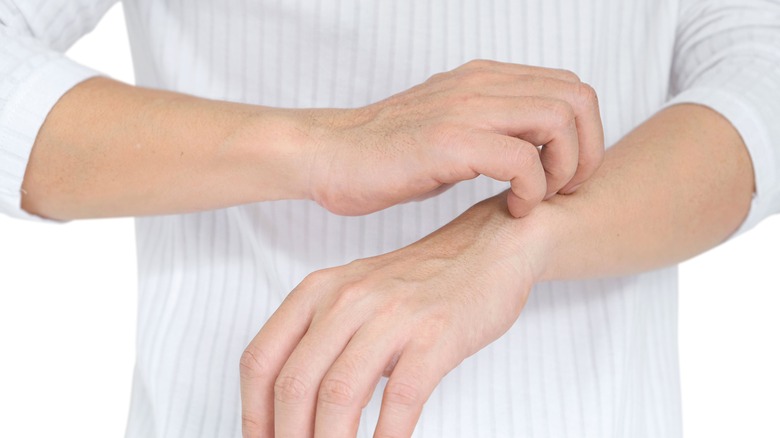What It Means When Your Wrist Itches
The phrase "an itch you can't scratch" exists for a reason. Itching can be one of the most frustrating bodily sensations, yet it's among the most common. According to Healthline, almost everyone experiences itching every single day. A typical itch is a prickly and sometimes burning feeling that encourages us to reflexively scratch to remove cells and other particles from the skin.
Itching more than usual is often a sign of irritation. Dryness or exposure to environmental irritants and allergens can cause excessive itching that's usually limited to only part of the body. The American Academy of Dermatology Association also notes that certain conditions of the skin can trigger uncontrollable itching. These can include shingles, chickenpox, and psoriasis, among others.
An itch on your wrist can have several causes, just like an itch on other parts of the body. However, there are a few factors that make the wrists especially likely to tickle. If you can't stop scratching, these reasons might explain why.
What causes itchy wrists
If you notice a persistent itch on your wrists but not elsewhere on the body, it could be related to how often you use your hands. A 2022 study published in Contact Dermatitis observed hand and wrist eczema in apprentice nurses, who are known to use and wash their hands and wrists frequently. Of the nurses studied, nearly half appeared to have skin inflammation indicative of eczema.
Irritants that come in contact with the wrists can also provoke scratching. For example, nickel in wrist accessories can cause an allergic reaction in some people (per WebMD). Symptoms often include itchiness, redness, and blistery rashes.
Insects and other creepy crawlers can also be behind itchy wrists. According to LaSante Health Center, the hands and arms are among the most common spots for bed bug bites. If uncovered, the wrist area may also attract mosquitos and other critters — including, in serious cases, dangerous mites and ticks. Healthline explains that a rash on the wrist could be from scabies, a condition where mites dig themselves into the skin, or Rocky Mountain spotted fever, a disease associated with tick bites.
In most cases, an itchy wrist is the result of minor irritation and will clear up on its own. But an itch that is accompanied by a rash or other symptoms could be an indication of a serious illness that requires treatment. Talk to your doctor if you notice bumps, skin discoloration, or other new symptoms.


